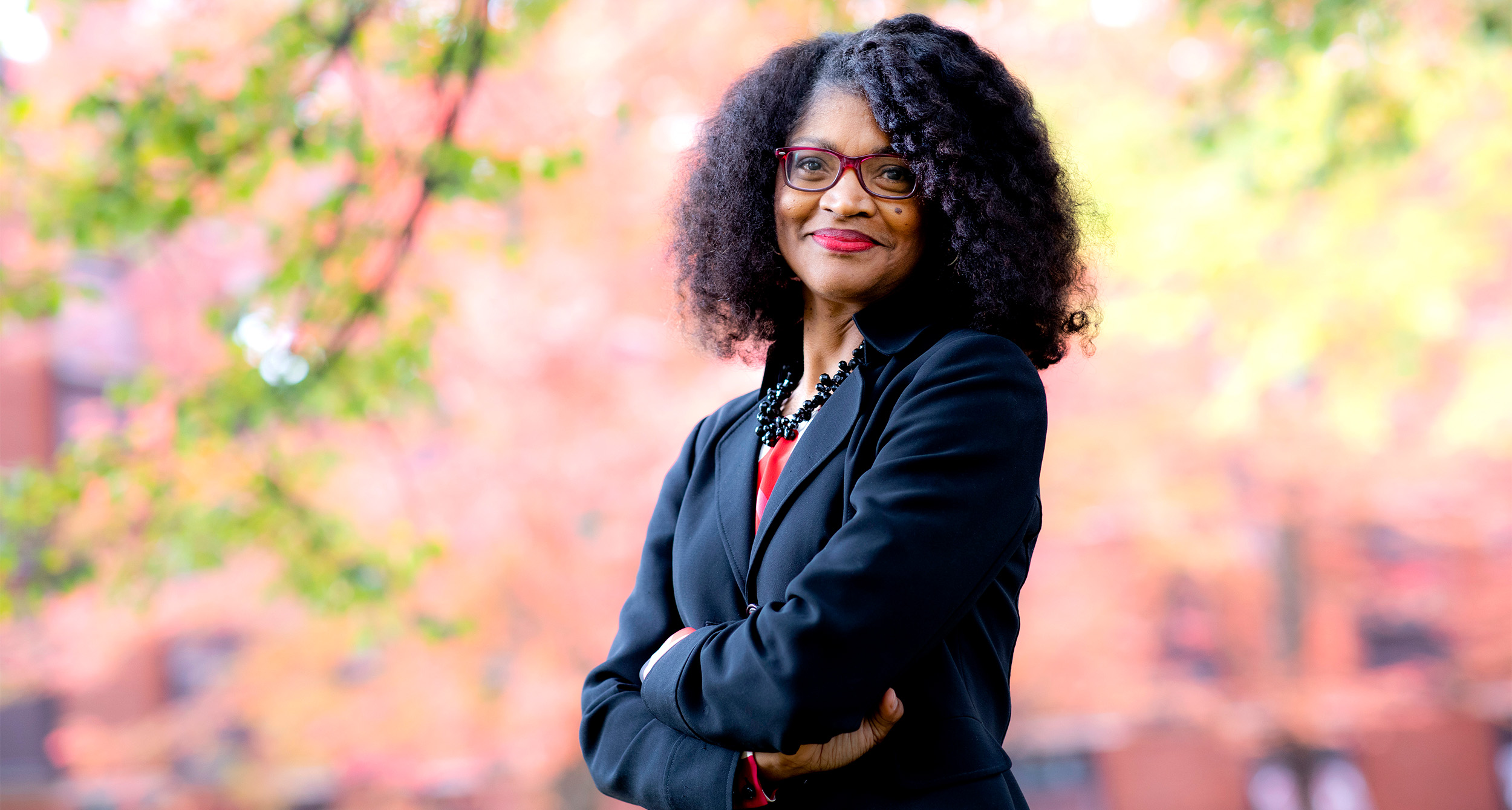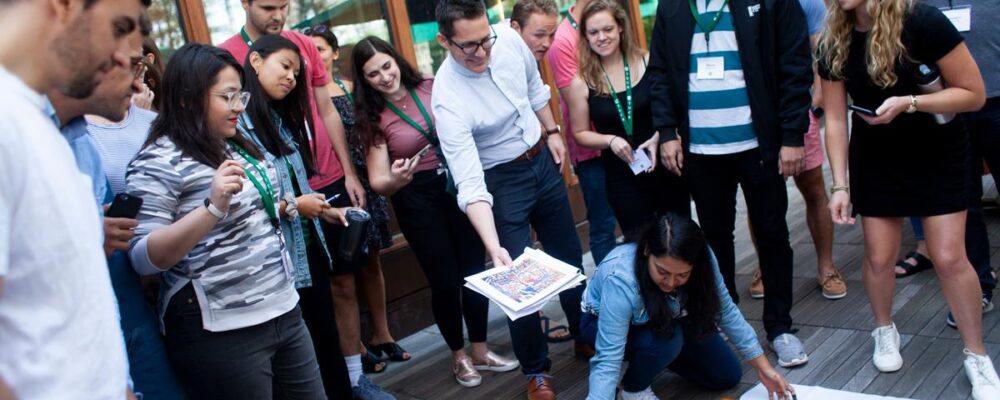Growing up, Gail Ayala Taylor would have heard about business from her father, Reginald “Ricky” Ayala. To Spartans fans, Ayala was the legendary #7 basketball player for Michigan State; to others, he was a distinguished businessman and CEO in Detroit known for his more than 30-year career in hospital administration.
But what if you didn’t grow up in a household where you heard about business and corporate life at the dinner table or around the house? Taylor, a longtime—and award-winning—clinical professor and research scholar at Tuck, is studying that now.
Can you tell us about your current research?
I’m super excited about it—I’m studying people’s transition from college to corporate, particularly people who are non-U.S. passport holders, children of immigrants, children of military personnel, first-generation college grads, or children with degreed parents who have pursued noncorporate careers. I call this group first-gen corporate. The group is amazingly diverse, but the common thread is that they don’t have parents with corporate managerial experience. First-gen corporates aren’t getting the added lessons at home on how to navigate corporate spaces. So in my research, I’m trying to understand the difference in the early career trajectories for first-gen and multigenerational corporates so organizations and managers can work to facilitate smoother transitions for first-gen corporates.
How did you come up with this as a research topic?
I taught in the Tuck Business Bridge Program for about 14 years, and I was co–faculty director with Bob Hansen [Norman W. Martin 1925 Professor of Business Administration] for five of those years. And that was just great. I loved Bridge and working with Bob. Years ago, a Bridge alum reached out after experiencing challenges in his first corporate job—it clearly wasn’t because of ability or potential, because this student was exceptional in so many ways. Peeling back the layers, we discovered that he struggled because he didn’t know how to navigate the corporate environment, being the first in his family to venture into this space.
Besides hard skills, there is a set of additional skills that are critical for career success, but these skills often aren’t taught or communicated. This challenge is part of why I launched a social-impact venture to help individuals coming into their careers.
— Gail Ayala Taylor, Clinical Professor of Business Administration; Faculty Director, Building a Successful Diverse Business program; Founder, RISE Career Launch
And this is part of a book you’re writing now?
Yes. In my research, I look at the college-to-career transition from two sides: first-gen corporate people, and the organizations that hire them. My book is focusing on the organizations side of the equation. It’s designed to help increase the understanding of factors that impact early career success, particularly for people who are first-gen corporate. We are conducting a large-scale study, and preliminary results show that about 50 percent of new corporate employees—recent college grads—are the first in their families to work in corporate spaces. We are working to identify the roadblocks and barriers that impact their success.
What is it about transitioning from college to career that can be so difficult for grads?
One thing that makes it challenging is that in college, there’s a ton of structure. You get a syllabus. It tells you exactly what you have to read for the course, what you need to know for class. You know what’s expected, you put your head down, you work hard, and you will do well. But when you graduate and start your career, there isn’t that structure. Besides hard skills, there is a set of additional skills that are critical for career success, but these skills often aren’t taught or communicated. This challenge is part of why I launched a social-impact venture to help individuals coming into their careers.
This is your career-launch program?
Yes, it’s built on what I call the RISE Framework. It’s evidence-based and centers around four key areas—Relationships, Inquiries, Skills, and Expectations—that provide a structure for people new to corporate careers. We have a curriculum that has been triple tested over time, and I created a tool to add further support. What is the one thing that all students who go to college do, no matter what their major is? They learn how to take notes. And so the tool I created is essentially a structured note-taking method by which people capture their own data each day when they’re starting their job. It’s a way for them to take a comprehensive look at their growth. And then continue forward.
Your Tuck impact extends beyond your research. Besides the MBA program and Bridge, have you taught in other Tuck programs?
I think I’ve taught in almost all of them! I’ve taught thousands of executives through Tuck Executive Education. I’ve also taught in the MEM [Master of Engineering Management] program and in the MHCDS [Master of Health Care Delivery Science] program. What I’ve loved most about teaching across all of these areas is, hands down, the fantastic people I’ve met. I’m amazed by the long-term relationships that I’ve been able to form over these 23 years with Tuck alums and my other former students. I’ve been invited to weddings, baby showers, award ceremonies, and other family gatherings. Honestly, I feel this speaks to the core of what makes Tuck special—it is very much about people and building community. It’s what makes Tuck, Tuck.
I’ve been invited to weddings, baby showers, award ceremonies, and other family gatherings. Honestly, I feel this speaks to the core of what makes Tuck special—it is very much about people and building community. It’s what makes Tuck, Tuck.
You’ve also taken on a new responsibility at Tuck.
Yes! I recently became the faculty director of the Building a Successful Diverse Business program in Tuck Executive Education. These businesses impact communities and the broader economy in important ways. I’ve been teaching in the program for over 15 years, and it’s been a highlight of my time at Tuck. I’m thrilled to be working behind the scenes to support these amazing businesses.
You have received many awards, both for your research and for your teaching and mentoring. How does it make you feel, to have been noted for all of that?
My parents taught me that I’m supposed to help people. I’m supposed to mentor. I’m supposed to make it easier for people coming behind me. To be recognized for doing this is an incredible honor.
Tuck School of Business
Please visit the firm link to site






